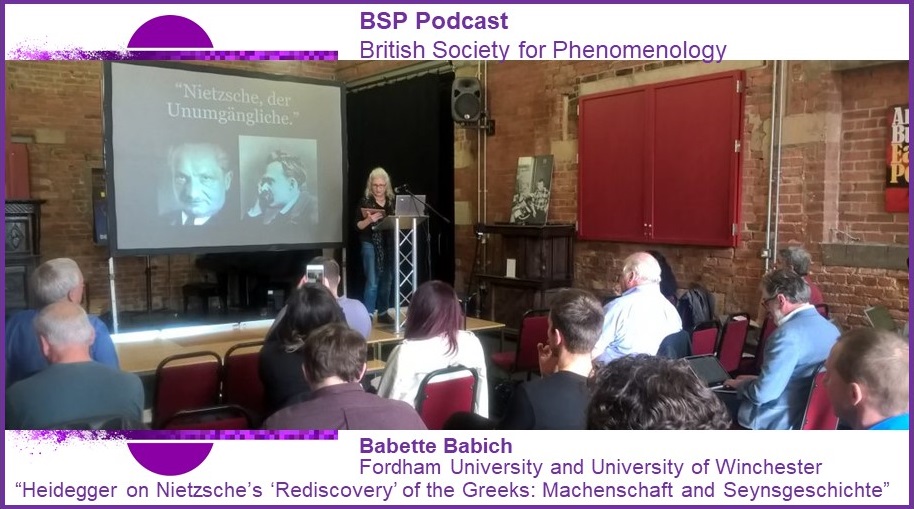The second episode of our podcast season four, a keynote presentation from our journal’s 50th Anniversary Conference held last year.
Season 4 episode 71: 6 June 2020
We continue season four of the British Society for Phenomenology Podcast with a keynote presentation from Babette Babich (Fordham University and University of Winchester). This recording comes from the JBSP 50th Anniversary Conference: On the History of Being – After the Black Notebooks (2019) which was held in celebration of fifty years of the Journal of the British Society for Phenomenology.
Babette Babich: ‘Heidegger on Nietzsche’s “Rediscovery” of the Greeks: Machenschaft and Seynsgeschichte in the Black Notebooks’
You can listen to this episode on the BSP’s Podbean site, and you can also find it on iTunes and all good podcasting apps by searching ‘BSP Podcast’.
ABSTRACT: One of the outcomes of the publication of the Black Notebooks has been to invite scholars to rethink their understanding of Heidegger’s thinking, including what is named Heidegger’s ‘world-historical anti-Semitism’, his relation to war and politics, via Schmitt and Jünger, as well as Heidegger’s thinking on machination/motorisation/calculation. Other possibilities include the university (education) in addition to Heidegger’s anxieties regarding the reception of Being and Time in the framework of the history of Beyng/Seyn. Echoing Heidegger’s lecture courses, we read that Nietzsche adumbrates “the end of metaphysics” yet remains nonetheless entangled in metaphysics. Heidegger’s reflections on the beginning of Western thought with Anaximander, Heraclitus, and Parmenides are matched here with his insistence that it is a “fable that Nietzsche rediscovered ‘pre-Platonic philosophy’”, destined one day “to be revealed in all its fabulosity [Fabelhaftigkeit]”. For Heidegger, “Nietzsche thinks purely in the Roman way” whereby Nietzsche’s “own metaphysics could never grasp the Greek beginning of Western thinking”. Inasmuch as Nietzsche “plays out the essence of being to a combat of power positions and power relations”, as Heidegger invokes typically bellicose interpretations of will to power, this powerplay consummates the “abandonment of beings by being, the abandonment that gained sovereignty in the history of metaphysics”. Given the contrast between historiology and history in Nietzsche’s meditation on history (apt and inapt) for life, as this bears on Machenschaft and the whole of Nietzsche’s philosophy, Heidegger’s opposition to Nietzsche’s putative ‘re-discovery of Pre-platonic philosophy’ yields a further question: “in what single sense is Nietzsche a transition, i.e., a preparation for another beginning of the history of beyng?”

Journal of the British Society for Phenomenology: Special Issue – Heidegger and the Black Notebooks (Volume 51, Issue 2, 2020). Babich’s paper, as well as others presented at JBSP 50th Anniversary Conference, has been reworked and published as an essay in this special edition.
The JBSP 50th Anniversary Conference: On the History of Being – After the Black Notebooks (2019) celebrated 50 years of the journal. The British Society for Phenomenology held a three-day conference at the International Anthony Burgess Foundation, Manchester, UK from 31 May to 2 June, 2019. The aim of the event was to examine the contribution of Heidegger’s Schwarze Hefte (Black Notebooks) to an understanding of the question of the history of being.
The British Society for Phenomenology is a not-for-profit organisation set up with the intention of promoting research and awareness in the field of Phenomenology and other cognate arms of philosophical thought. Currently, the society accomplishes these aims through its journal, events, and podcast. Why not find out more, join the society, and subscribe to our journal the JBSP?

